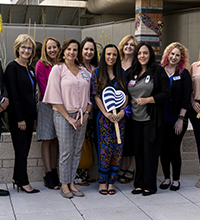March of Dimes launches new NICU Family Support® Program in Phoenix
05/02/2022
While the U.S. grapples with a maternal and infant health crisis and the rate of preterm births increase in Arizona, March of Dimes is launching a NICU Family Support® Program to support families throughout their pregnancy journey and raise critical funds to improve health outcomes for moms and babies.
Maternal mortality rates are on the rise nationwide and the latest March of Dimes Report Card shows Arizona has a 9.5% preterm birth rate, earning the state a C+ grade. The preterm birth rate for Black women is 41% higher than the rate among all other women.
“The COVID-19 pandemic has exacerbated the maternal and infant health crisis. In Phoenix, 1 in 11 babies is born too sick and too soon and babies of color are disproportionately impacted,” said Deena Bradford, Executive Director, Market Impact for Arizona. “March for Babies is an opportunity for our community to unite to end preventable preterm birth and maternal death so that every mom and baby gets the best start possible.”
March of Dimes is spearheading several initiatives in the state, including a partnership with Banner Health Foundation to bring the NICU Family Support® Program to Banner - University Medical Center Phoenix. The program supports more than 50,000 families each year in more than 70 hospital partner sites by increasing families’ knowledge and confidence to care for their baby while in the NICU.
“We are proud to work with the March of Dimes to help support more families at Banner University – Medical Center Phoenix through the NICU Family Support® Program,” said Andy Kramer Petersen, President & CEO for the Banner Health Foundation. “Together, we can provide much-needed help to ensure families and our littlest patients have access to best-in-class care and resources.”
Additionally, March of Dimes Mobile Health Program is providing free health care to uninsured and underinsured patients in Southern Arizona. To date, over 35,000 COVID-19 vaccines have been provided at 81 events to a largely (86 percent) uninsured patient population. This is in addition to the program’s work in prenatal care, family medicine, acute care for the homeless and more.


